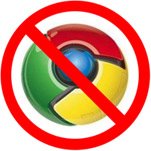 Google lit up the hornet's nest yesterday when they announced that they were dropping built-in support of H.264 for their own 'open' WebM and OGG video formats.
Google lit up the hornet's nest yesterday when they announced that they were dropping built-in support of H.264 for their own 'open' WebM and OGG video formats.
I reconfigured Xmarks on all my computers (to sync all my bookmarks between FireFox, Safari and Chrome), and I'm back to using Safari full-time, with FireFox as my main backup. (FF 4.0 can't come soon enough).
It was good knowing ye, Chrome. I actually had my sights set on using Chrome indefinitely until yesterday.
(One of the many reasons I detest this decision by Google is that I have tested the waters of using WebM and/or OGG video for some web projects (using the HTML5 video tag), and found it sorely lacking, and a major pain to even attempt to use.* If I'm having so much trouble getting video into this ridiculous format, how can I ever expect my Mom/Sister/Friend/Brother/whomever is not as tech-y as I to do it?!).
Google: Please rescind your decision. For the good of the web, and for the good of my 500+ already encoded videos, and for the good of web developers, video content producers, and device makers everywhere.
For anyone else switching from another browser to Safari, here are a few tips:
- Install Xmarks to sync your bookmarks. It's awesome.
- Install Keywurl to search from Safari's address bar - it's even better than the 'wonder bar' or whatever it's called in Chrome. (How to install for Safari 5).
- Install the Ultimate Status Bar extension for Safari, and ditch the status bar. It's also awesome.
The only thing I love about Chrome that I can't do with Safari is use the Shift+Command+N shortcut to quickly open a 'private browsing' window. Oh well.
Just six months ago, I switched from Chrome to Safari when 5.0 was released... but then I switch back to Chrome again for it's private browsing keyboard shortcut (I used that a lot for website anonymous user testing...). Now back to Safari!
Comments
Another note, that I've seen oft cited in comments: Google wants to remove H.264 because it's not 'open,' yet they include their own Adobe Flash plugin? What's the deal with that? This seems to be a decision made fully because Google wants what's best for them. Not for the 'web' or the 'community.'
Another comment posted on Google's own posting, which I think is very poignant:
Comment left by morganick, January 11, 2011 10:16 PM
A snappy retort from Tim Sneath: http://blogs.msdn.com/b/tims/archive/2011/01/11/an-open-letter-from-the…
Firefox was once being equally boneheaded about this, but they did change their mind. This kind of codex Puritanism is idiotic since it does nothing to achieve greater video access for the internet as a whole.
This is total Chrome FAIL in that a decent browser will lose market share while retaining embedded Flash support of all things. Rather inconsistent that. Well Adobe couldn't be happier.
Safari has been my goto browser along with Chrome.
Jeff Miller,
When was Mozilla being bone‐headed and when did they change their mind?
They are still only supporting Ogg & WebM in Firefox, and will never change that position.
I would suggest you go through the list in the URL and ask you if your ok with paying them a hefty fees if they suddenly impose a user fees in the future???
http://www.mpegla.com/main/programs/AVC/Pages/Licensors.aspx
Don't write stuff without understanding it fully
I have—honestly—read through practically every document having to do with H.264 licensing, technical implementations, etc., as well as much of the WebM documentation.
And I really don't care about the licensing... it only applies to companies who charge for video content or make encode/decode implementations (in certain cases). Most of these companies (even the Mozilla foundation) can make these payments, but some choose not to.
I'd be worried if I were one of the WebM backers, at least to a certain extent, because Google has never guaranteed they'd protect any other WebM-using companies in case of possible future lawsuits or patent violations (as yet undiscovered). But even that is not the main issue.
The main issue I have is that WebM is certainly not the video technology that is optimal for use as a web codec right now, and it may never be.
Even if I were going to start encoding in WebM right now, I'd have to spend at least many hours finding a way to incorporate it in my workflow, since there's no integration with the main software packages I use for ripping, encoding, producing, editing, and managing video...
As soon as it's as easy to encode WebM as H.264 on my iPhone, in Quicktime, in Final Cut Express, in iMovie, in Windows Movie Maker, in Adobe Premiere, etc. (and not just one of those tools - I use all of them, as I see fit... yes, even WMM), then I'll consider switching.